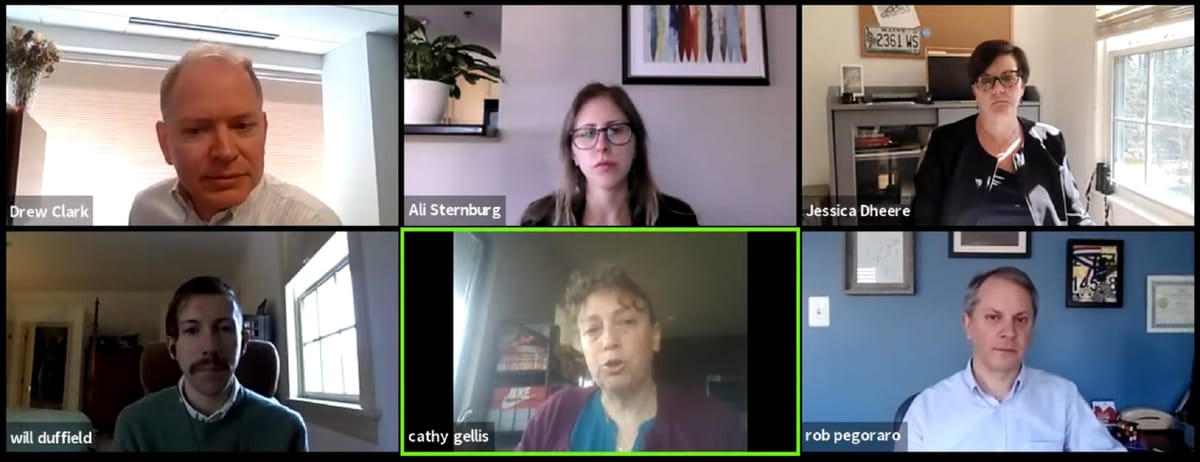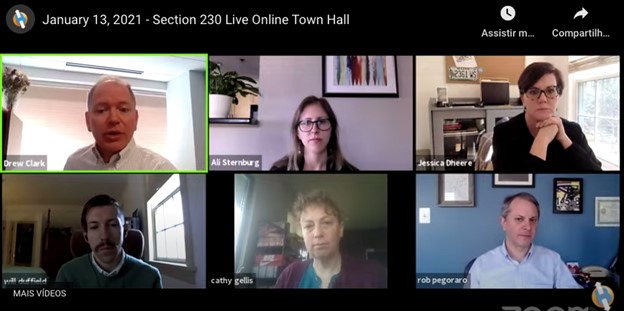Crackdown on Online Conspiracy Speakers After January 6 Highlights Need for Platform Accountability
WASHINGTON, January 14, 2021 – The power of big technology companies has been on display in the week since the insurrection of January 6, as platform companies have clamped down on speakers and web sites promoting violence and conspiracies, said panelists in a Broadband Breakfast Live Online event o

WASHINGTON, January 14, 2021 – The power of big technology companies has been on display in the week since the insurrection of January 6, as platform companies have clamped down on speakers and web sites promoting violence and conspiracies, said panelists in a Broadband Breakfast Live Online event on Wednesday.
The implications for Section 230 of the Communications Decency Act were also addressed, as panelists discussed the kinds of protection and immunity from liability currently enjoyed by tech platforms both large and small.
Attorney Cathy Gellis expressed that we have a governance problem, not a technology problem.
That’s why, she said, solutions to the problem should not target particular technologies or policies that enable technologies, like Section 230.
Journalist Rob Pegoraro acknowledged the growing concern with the market power of tech companies, for example, in the ability of Apple and Google to block the smart phone app for Parler, the conservative social media tool, and of Amazon, to take Parler off the internet completely.
He and Jessica Dheere, director of the Ranking Digital Rights program at New America, said that tech companies have made rapid decisions when they should have been made gradually and incrementally. Instead, they were responding impulsively to the storming of the Capitol and associated social media chatter.
Dheere also said that tech companies should be transparent on how they are doing making these actions and be consistent on such decisions.
Panelists pointed out that Section 230 benefits not only large companies but small online players, too. Marginalized voices don’t have the same tools the president of the United States has. and platforms such as Twitter have been a big megaphone to many to speak up. It is really important to educate policymakers and staff; of all the impacts it can take on a variety of stakeholders.
Where would we be without Section 230?
Getting upset with the internet automatically makes people upset with Section 230, said Gellis in reply to a question from moderator Drew Clark, editor and publisher of Broadband Breakfast, about why Section 230 remains important.
That is not a problem with the Section 230, she said, even though it is an unusual law in that it is structured to incentivize good action as opposed to penalizing bad actions.
But changes to one part of the internet ecosystem can have negative impacts on another, said Ali Sternburg, senior policy counsel at the Computer and Communications Industry Association. She highlighted the need for a global standard and accountability and transparency to these platforms.
In offering up final thoughts in the one hour conversation, panelists – who were generally supportive of keeping Section 230, offering up suggestions to educate about the law, and to address other, related issues like privacy and competition.

Understand the problems and challenges before breaking through, said Gellis.
Wrecking the entire social media ecosystem will not resolve the problems, said Pegoraro.
Progress with these problem needs to look with scrutiny at these businesses models and algorithms. It does not include scrapping Section 230, but adding it to it, said Dheere.
Policy makers should read Section 230 before changing it, said Sternburg. Education continues to be important on this space and should come first before taking action to change the law.
Will Duffield, policy analyst at the Cato Institute, said that pushing de-favored speakers off mainstream tech platforms is not a static endpoint: Doing so will increase the creation of alternative and perhaps more decentralized infrastructure options. No single actor will be able to remove speakers from such a structure, he said.
Special Broadband Breakfast Live Online Town Hall on Section 230 on Wednesday, January 13, 2021

Events in the “Section 230: Separating Fact From Fiction” Series from July 2020 include:

- Event 1: Wednesday, July 1, 2020 — “Content Moderation: How it Works, Why it Works, and Best Practices”
- This panel will consider how different platforms approach content moderation, comparing reasons for a more active or more laissez-faire approach. It will consider what “best practices” have emerged for ensuring online diversity without permitting online harassment. It will also feature a discussion of how platforms moderate content in the U.S. versus internationally.
- Event 2: Wednesday, July 8, 2020 — “Section 230 in an Election Year: How Republicans and Democrats are Approaching Proposed Changes”
- Is Section 230 the new bugaboo of election years? Will life return to normal in 2021? This panel will explore the combination of forces that have made Section 230 susceptible to political pressure from both sides of the aisle.
- Event 3: Wednesday, July 15, 2020 — “Public Input on Platform Algorithms: The Role of Transparency and Feedback in Information Technology”
- This panel will consider what role governments have, or should have, in reacting to the power of tech platforms vis-à-vis their role in public discourse. It truly aims to consider the pros and cons of government and public involvement and engagement in pushing platforms to adopt greater transparency about the use of their algorithms.
SUBSCRIBE to the Broadband Breakfast YouTube channel. That way, you will be notified when events go live. Watch on YouTube, Twitter and Facebook.
See a complete list of upcoming and past Broadband Breakfast Live Online events.










Member discussion